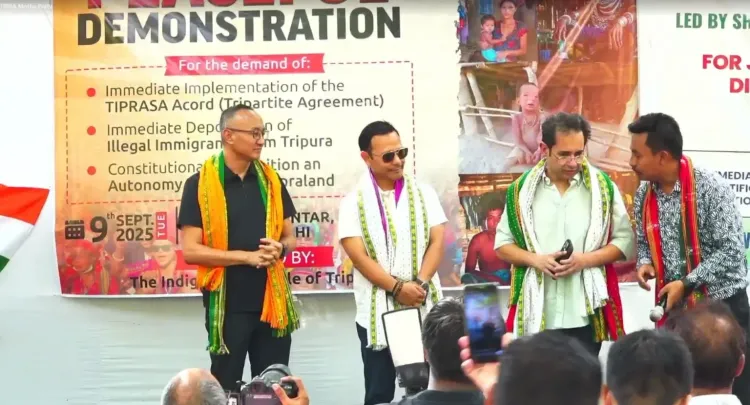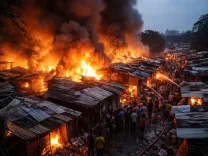Why is BJP Ally TMP Protesting in Delhi for Tripartite Accord Implementation?

Synopsis
Key Takeaways
- Implementation of 'Tiprasa Accord' is a key demand.
- Protest led by young tribal leader David Murasing.
- Collective action through torch rallies across Tripura.
- Call for constitutional recognition of 'Greater Tipraland.'
- Political dynamics in Tripura are shifting with TMP's involvement.
New Delhi/Agartala, Sep 9 (NationPress) The Tipra Motha Party (TMP) from Tripura, an ally of the ruling BJP, organized a protest in New Delhi on Tuesday to advocate for their three key demands, which include the execution of the tripartite agreement that was signed in March of the previous year.
This protest, held near Jantar Mantar in the capital, was the result of a remarkable 'Pedal Yatra' stretching over 2,500 km, led by young tribal leader David Murasing, who journeyed from Tripura to New Delhi.
The demands of TMP include the enforcement of the tripartite 'Tiprasa Accord' signed on March 2 last year in Delhi, the expulsion of illegal immigrants from Tripura, and the constitutional recognition of a separate entity known as ‘Greater Tipraland’.
Among the speakers at the protest were TMP chief Pradyot Bikram Manikya Debbarma, BJP MP and Pradyot’s elder sister Kriti Devi Debbarman, former Meghalaya Minister and National People’s Party (NPP) Working President James Sangma, along with former Nagaland minister and BJP national spokesperson, Mmhonlumo Kikon.
Several MLAs from Nagaland and Tripura, and members of the Tripura Tribal Areas Autonomous District Council (TTAADC) also contributed their voices to the assembly.
Pradyot Debbarma expressed his frustration regarding the delays in executing the tripartite agreement made 18 months ago between the Central and Tripura governments and the TMP, stating, “We have waited patiently, but our patience is wearing thin.” He pointed out that while the Central government has been mostly supportive, some leaders in Tripura are hindering progress on these issues.
The TMP leader also revealed plans for a state-wide movement in Tripura next month aimed at rallying public support and collaborating with leaders across political lines to advocate for the rights of indigenous tribal communities.
In a display of unity, torch rallies were conducted in each block of Tripura on Tuesday, echoing the same demands and amplifying the collective voice of the indigenous populace, as communicated by a TMP spokesperson.
The Agartala torch rally, which commenced from the Swami Vivekananda Stadium, saw significant participation from tribal youths, TMP MLAs, TTAADC members, and supporters.
As previously announced, no party flags were displayed during the protest, with only the national flag being carried.
Protesters chanted slogans urging Union Home Minister Amit Shah to execute the tripartite accord ‘Tiprasa Accord’, accelerate the deportation of illegal immigrants, ensure constitutional backing and autonomy for the separate tribal state of Greater Tipraland, and conduct the long-overdue Village Committee elections in TTAADC territories.
After a year of intense negotiations leading to the signing of the tripartite agreement with the Centre and the Tripura government on March 2 last year, the then-opposition TMP, holding 13 MLAs, joined the BJP-led coalition government in the state on March 7 last year, adding a new dynamic to Tripura's political landscape. Two TMP MLAs, Animesh Debbarma and Brishaketu Debbarma, were appointed to the ministry led by Chief Minister Manik Saha.
The TMP has been administering the 30-member politically significant Tripura Tribal Areas Autonomous District Council (TTAADC), which oversees two-thirds of Tripura's 10,491 sq km area, home to over 1,216,000 people, with approximately 84 percent being tribal.










